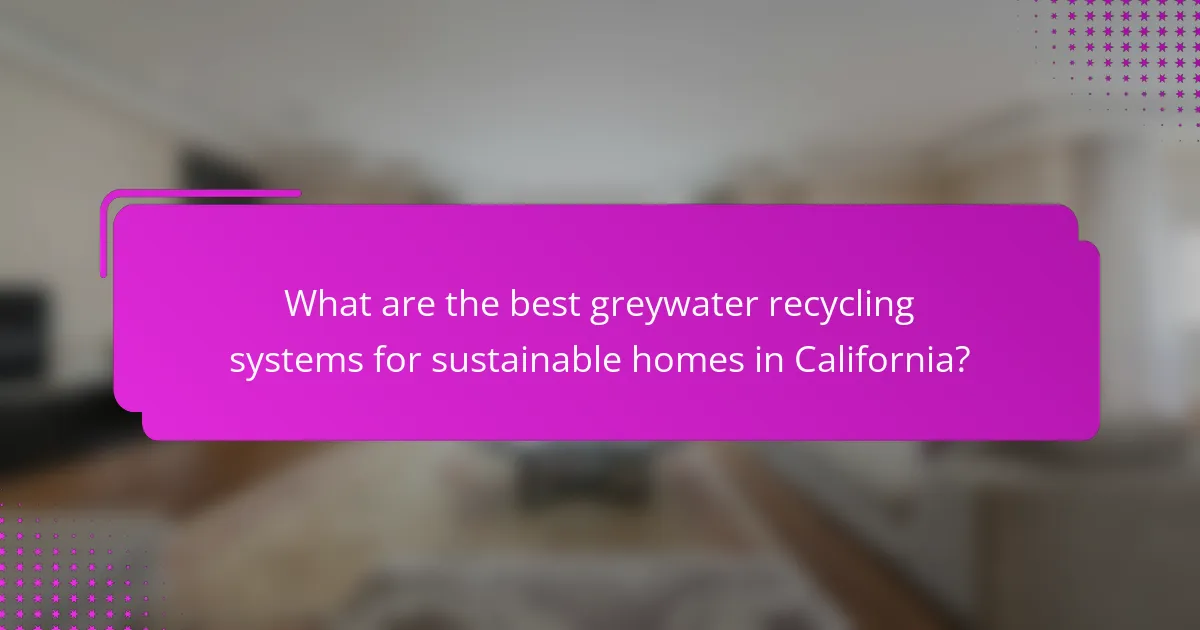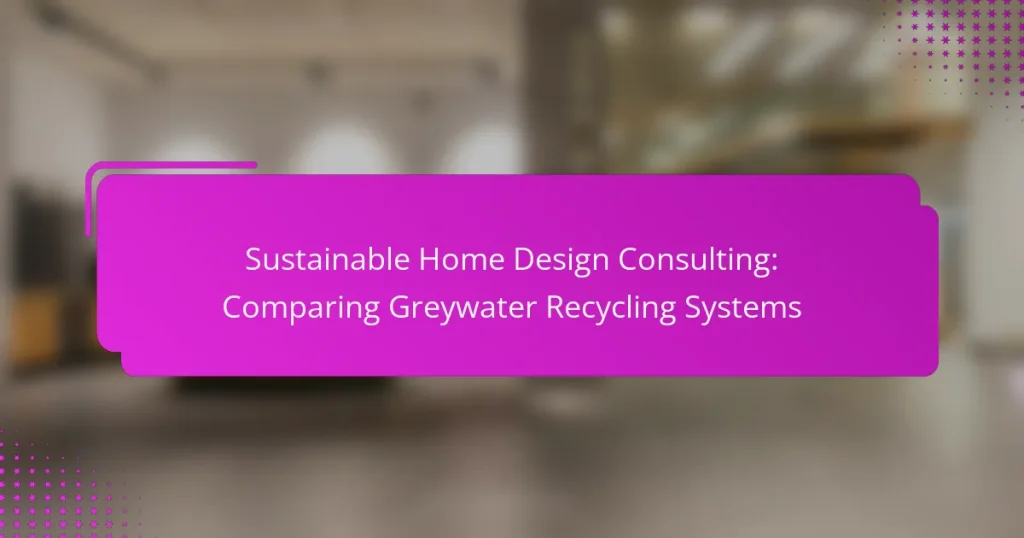Greywater recycling systems are an essential component of sustainable home design, particularly in water-scarce regions like California. By collecting and treating wastewater from sinks, showers, and washing machines, these systems enable homeowners to reuse water for irrigation and other non-potable applications, promoting conservation and reducing reliance on municipal supplies. When considering a greywater system, it’s important to evaluate factors such as efficiency, installation requirements, and compliance with local regulations to ensure optimal performance and sustainability.

What are the best greywater recycling systems for sustainable homes in California?
The best greywater recycling systems for sustainable homes in California include options that effectively reuse water from sinks, showers, and laundry for irrigation and other non-potable uses. Key factors to consider are efficiency, installation requirements, and compliance with local regulations.
Brac Systems
Brac Systems offers a range of greywater recycling solutions designed for residential use. Their systems typically involve a simple installation process, allowing homeowners to redirect greywater from showers and sinks to irrigation systems. This can reduce water bills significantly, especially in California’s dry climate.
One notable feature of Brac Systems is their user-friendly interface, which allows homeowners to monitor water usage and system performance easily. It’s essential to ensure that the system complies with California’s greywater regulations, which may require permits and adherence to specific guidelines.
WaterFix
WaterFix specializes in greywater recycling systems that are tailored for both residential and commercial applications. Their systems are designed to treat and reuse greywater efficiently, providing a sustainable water source for landscaping and irrigation. WaterFix systems can often be integrated with existing plumbing, minimizing installation disruption.
When considering WaterFix, homeowners should evaluate the maintenance requirements and any potential costs associated with system upkeep. Regular maintenance is crucial to ensure optimal performance and compliance with local health regulations.
EcoGrey
EcoGrey provides innovative greywater recycling solutions that focus on sustainability and ease of use. Their systems are designed to filter and treat greywater, making it safe for irrigation and other non-potable uses. EcoGrey emphasizes eco-friendly materials and energy-efficient processes in their designs.
Homeowners interested in EcoGrey should assess the initial investment and long-term savings on water bills. Additionally, understanding the local regulations regarding greywater use is vital, as these can influence the choice of system and its installation requirements.

How do greywater recycling systems work?
Greywater recycling systems collect and treat wastewater from sources like sinks, showers, and washing machines for reuse in irrigation or toilet flushing. These systems help conserve water and reduce the demand on municipal supplies, making them a sustainable choice for homeowners.
Filtration process
The filtration process in greywater recycling systems is crucial for removing contaminants before reuse. Typically, this involves several stages, including sedimentation to settle out larger particles, and filtration through sand or activated carbon to eliminate smaller impurities and odors.
Homeowners should consider the type of greywater being recycled, as different sources may require varying levels of filtration. For instance, laundry water often contains detergents that may necessitate more advanced treatment compared to shower water.
Storage and distribution
Once filtered, greywater is stored in a tank designed to prevent bacterial growth and odor. The tank should be made of materials that resist corrosion and be equipped with a level indicator to monitor the water supply.
Distribution systems can vary, with options including gravity-fed systems or pumps to deliver the treated greywater to irrigation systems or toilets. Homeowners should ensure compliance with local regulations regarding greywater use, as some areas have specific guidelines on storage and distribution methods.

What are the benefits of greywater recycling systems?
Greywater recycling systems offer significant advantages, including water conservation, cost savings, and positive environmental impacts. By reusing water from sinks, showers, and laundry, these systems reduce overall water consumption and lower utility bills.
Water conservation
Greywater recycling systems play a crucial role in water conservation by repurposing water that would otherwise go to waste. Households can save a substantial portion of their water usage, often between 30-50%, depending on the system’s efficiency and household habits.
Implementing a greywater system allows homeowners to use the recycled water for irrigation, toilet flushing, and other non-potable applications. This practice is especially beneficial in regions facing water scarcity, helping to alleviate pressure on local water supplies.
Cost savings
Investing in greywater recycling can lead to significant cost savings on water bills. By reducing the amount of fresh water drawn from municipal sources, homeowners can see a decrease in monthly utility expenses, often recouping their initial investment within a few years.
Additionally, some regions offer incentives or rebates for installing greywater systems, further enhancing potential savings. It’s advisable to research local regulations and available financial support to maximize the economic benefits of these systems.
Environmental impact
The environmental benefits of greywater recycling systems are substantial. By reducing the demand for freshwater, these systems help preserve local ecosystems and reduce the energy required for water treatment and distribution.
Moreover, using recycled water for irrigation can minimize runoff and pollution in waterways, contributing to healthier environments. Homeowners can actively participate in sustainability efforts while enjoying the practical advantages of greywater systems.

What are the installation requirements for greywater systems in Los Angeles?
In Los Angeles, greywater systems must comply with specific installation requirements, including permits, plumbing modifications, and adherence to local regulations. Understanding these requirements is crucial for homeowners looking to implement greywater recycling effectively.
Permitting process
The permitting process for greywater systems in Los Angeles involves obtaining a permit from the Los Angeles Department of Building and Safety (LADBS). Homeowners must submit an application that includes details about the system design, intended use, and plumbing layout.
It is advisable to consult with a licensed contractor familiar with local codes to ensure compliance. The permit fee typically ranges from a few hundred to over a thousand dollars, depending on the complexity of the system.
Plumbing modifications
Installing a greywater system often requires significant plumbing modifications to separate greywater from blackwater. This might involve rerouting pipes and installing diverters to direct greywater to irrigation systems or storage tanks.
Homeowners should ensure that all modifications meet local plumbing codes and consider hiring a professional plumber experienced in greywater systems. Proper installation is essential to prevent contamination and ensure the system operates efficiently.

How to choose the right greywater recycling system for your home?
Choosing the right greywater recycling system involves assessing your household’s water usage, the system’s capacity, maintenance requirements, and budget. Understanding these factors will help you select a system that meets your needs while promoting sustainability.
System capacity
System capacity refers to the amount of greywater a recycling system can handle daily. For an average household, systems typically range from 200 to 1,000 liters per day, depending on family size and water usage habits.
Consider your household’s water consumption patterns when evaluating capacity. For instance, if you frequently do laundry or have a large garden, opt for a system with higher capacity to ensure adequate supply for irrigation and other non-potable uses.
Maintenance needs
Maintenance requirements can vary significantly between greywater systems. Some systems may need regular filter cleaning or pump servicing every few months, while others may require less frequent attention.
It’s essential to understand the maintenance demands of each system type. For example, a simple gravity-fed system might have lower maintenance needs compared to a more complex mechanical system. Regular upkeep is crucial to ensure efficiency and longevity.
Budget considerations
Budget is a critical factor when selecting a greywater recycling system. Initial costs can range from a few hundred to several thousand dollars, depending on the system type and installation complexity.
In addition to upfront costs, consider ongoing expenses like maintenance and potential water savings. Some systems may qualify for local rebates or incentives, which can help offset initial investments. Always evaluate the total cost of ownership to make an informed decision.

What are the common challenges with greywater recycling systems?
Greywater recycling systems face several challenges that can impact their efficiency and usability. Key issues include the complexity of installation, maintenance requirements, and potential regulatory hurdles that vary by location.
Installation complexities
Installing a greywater recycling system can be intricate, often requiring modifications to existing plumbing. Homeowners must consider the layout of their property and the type of greywater they intend to recycle, such as from sinks or showers. Engaging a qualified professional is crucial to ensure proper setup and compliance with local codes.
Maintenance requirements
Regular maintenance is essential for the effective operation of greywater systems. This includes cleaning filters, checking pumps, and monitoring water quality to prevent contamination. Homeowners should plan for routine inspections, which can be time-consuming and may incur additional costs.
Regulatory hurdles
Regulations regarding greywater recycling can vary significantly by region, impacting system design and operation. Some areas may have strict guidelines on what types of greywater can be reused and how it should be treated. Homeowners should research local laws and possibly consult with local authorities to ensure compliance before installation.


